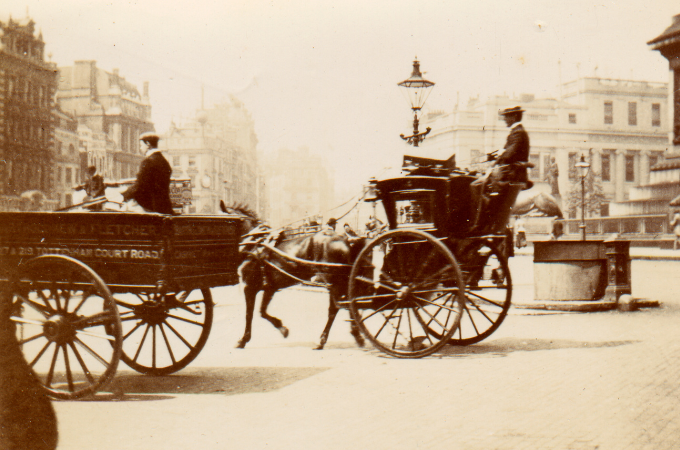
“As long as she thinks of a man, nobody objects to a woman thinking.”
– Virginia Woolf
I. The United Kingdom, London, 1839
She leaned away from the carriage window, the vulgar shouts of the people muffled behind its cherrywood walls. Clutching the folds of her dress, she inhaled deeply and paid attention, instead, to her heartbeat, its rhythm wild and reminiscent of a fleeing army. Don’t listen to them.
Expelling the burdensome air, Hadassah at last managed to block out the venomous wails of her fellow townspeople. They threw rotten tomatoes at her—fruits, vegetables and even stones. Anything they could get their hands on they seized. Many of them bounced off the carriage to be crushed beneath its gilded wheels while others successfully passed through its window only to fall harmlessly at her feet. Hadassah sealed it and drew the curtain over it.
“Go back to where you came from!”
“Die!”
“You don’t belong ‘ere!”
“Bastard!”
Don’t listen to them, she reminded herself. Yet how could she not when their words washed over her like a great wave relentless in its tide? Beneath them, faint but distinct, were the sharp cries of their opposers.
“Death to the Queen!”
“Down with the Monarchy!”
“Three cheers for the Negress!”
“Show ‘em who we are!”
How had it come to this? She never asked for any of this. She didn’t want to be this.
Yet here she was.
Hadassah untangled her hands from the folds of her skirt, reaching over to the opposite seat and retrieving the piece of paper that had brought her to this moment. Unfolding it, she stared at the gracefully woven strokes of ink, the handwriting of a dead man. Her heart calcified as she perused the words for the hundredth time, seeing in them that this was, in fact, not what she wanted to be but what she needed to be. Besides, it was far too late to change her mind. Pulling back the curtain just a smidge, Hadassah made out the bars of black iron steadily approaching, guarding the stark palatial walls of Buckingham Palace. She was about to meet the Queen.
***
It was glaring from the beginning of that day, the oddities that were shortly to follow. Perhaps she should have paid more attention when they found one of them singing in the sink. Could be she might have been less perturbed about what followed.
The morning was frigid and cold as mornings tended to be for her in Apsley House. The floor she slept on was as hard as steel, not even the hay could warm it, but it did its job the best it could. Sleep evaded her most nights as a result, also, in part because of the snoring drifting down from the housekeeper’s mattress. Every morn she woke to that sound of gravel hopping on cobblestone, so loud was its staccato it overpowered that of the cockerel. Soon, she came to rely on it to wake her for the day’s duties.
It was strange, then, rather than the noise of a nearby stone quarry, Hadassah woke to the sound of disembodied chirps and humming. When she trudged out of bed and followed the dissonant sound into the kitchen, half of the duke’s household was already gathered within the musty space, around the sunken sink, mumbling and grumbling to the person that so disruptively woke them. It was Patricia, his grace’s longest, and therefore oldest, servant. She was no longer as young as she once was, hobbling rather than sashaying and applying powder over pockmarked cheeks, not the velvet ones she believed had been preserved. It came as no surprise to Hadassah then when Patricia also fell ill the next hour, much the same time as the duke.
The whispers of bewitching and curses rose as quickly as the summer heat. Even Mistress Dianna, the pious housekeeper, had warned the servants away from Old Patty’s door. Hadassah, often at the mercy of their japes and rumours, was sceptical and leaned towards a far simpler explanation: The Duke of Wellington was dying. And she believed it to be true, lest her judgement be as misguided as Patricia’s. Over the last weeks following his return from an overseas journey, the duke had taken to his bed more often than he was wont to do. As one of his personal servants, she noticed his skin was losing its strong lustre with each day and he’d wake up, shivering as if beset by a powerful gale of ice. He was no longer able to hold his food and ingots of blood splattered his chamber pot. Mistress Dianna dismissed her worries when she brought the matter to her, “The duke is a man of healthy means and strong capabilities. If he were to fall ill, it could only be the plague.” Her tone changed entirely when the doctor said as much.
It was not the plague, but rather something of an unknown nature. The doctor’s remedies, once so reliable, failed time and time again, his grace falling deeper with each passing day. His other physician was sent for a week later. His own skills, adept they were on Old Patty who seemed to be making a steady recovery, failed miserably on the duke. Hadassah stood by, watching as he was sliced open and left to bleed into a silver bowl; serving, waiting, she should have been, not scrutinizing this man’s failed attempts as she was. His grace was as pale as his bones within the month, the very structure of his body peeking through translucent skin. It is one thing to believe a man is dying. Another to sit by and watch, like the Dark Grim, waiting to snatch his soul the moment it fled his body. She regarded it as the highest honour at first, when the duke asked her to stand within his quarters, keeping watch over him like an angel. He asked for no one else, elevating her esteem, yet her standing with the other serfs suffered because of it, for who would not wish to be in the presence of a great man in his last moments?
It was a sorry sight, to be sure, more so when Old Patty died days before he did. Soon, the physicians morphed into lawyers, blood turned to ink and papers as dry as his grace’s skin littered his personal study. She did not stay for that. Two days would pass before she was summoned again. When she was, it was to listen to the gasps of a dying man and his lawyer, an astute Mr. Jenkins who was as tall and just as truth. It is why she had to believe him when he spoke his master’s final wishes. At first, a bucket of icy water washed over her, drenching every fibre of her skin. Then came the heat, the pressure. It was unbearable. She couldn’t breathe, the words falling from his tongue, stifling her with every syllable.
“The duke is your father,” he said in a low voice, as if the walls had ears. “A truth that must not yet come to light until the time is right and you have attained an audience with Her Majesty. His lands, estates and titles shall pass on to you. You shall inherit a total sum of—”
“This is a lie,” she protested, looking to the pale, dying man between them as if he would revitalize and agree with her. He did not. His breaths were so shallow now one could not truly believe he still lived.
Mr. Jenkins frowned, “If only it were.”
The ‘what’ of the matter was answered before she asked, in that very moment. The ‘how’ would come later. His great omission, perhaps the one that would have spared the lives lost in the times to come, was the why.










Tosin October 07, 2023 12:19
Hearts! <3